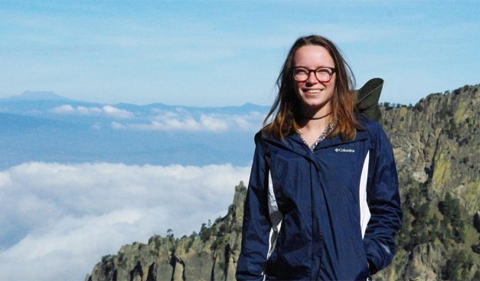The Happy Beginnings series features College of Arts & Sciences graduates who are getting started in careers, graduate school and service.
Rachel Broughton is a senior studying anthropology in the Honors Tutorial College and a member of the Center for Law, Justice & Culture’s Certificate Class of 2020.
She cites her experiences in the organization Students for Law, Justice & Culture and in the Certificate for Law, Justice & Culture as pivotal in her academic career.
What do you plan to do upon graduation?
After graduation, I plan on seeking internships at museums that are cultural literacy- and social justice-oriented, and then applying for a master’s program in museum studies or public history!
How has the organization Students for Law, Justice & Culture affected your time at Ohio University?
I have been the president of the student organization, Students for Law, Justice & Culture since my junior year. The first time I went to an SLJC meeting, I was immediately intimidated by the level of conversation happening in the room. We were discussing current events, what we were learning in class, the books we were reading, and folding it all into a law & society framework.
This organization has been so rewarding to be a part of. You know when you’re having a class discussion about a reading you were really interested in, but no one seems to have read it, and the conversation doesn’t really go anywhere? You’re just kind of stuck in this loop of questions you want to ask and unsatisfied curiosities…. The SLJC is a place where you can bring in those discussions and just talk about them from hours, from different standpoints, analyzing and processing what you’re interested in or what you’re learning about.
I am learning constantly from the others in SLJC, and after that initial intimidation I was never afraid to admit when I didn’t know what it was that someone was talking about. It’s an open group, more than willing to educate one another, and we bring in faculty when all of us want to know more!
It’s been so great to share my passions with the group and work on projects that we are all extremely interested in. It’s also been a wonderful way for me to get to know faculty members on a more personal basis and hear what it is they’ve dedicated their time to researching and exploring.
Sometimes, SLJC has also just been a place for a bit of catharsis, we are all highly motivated students and sometimes it’s nice to just vent about our workloads, support one another, and groan about the often ridiculousness of politics.
What drew you to apply to the Certificate for Law, Justice & Culture?
What sparked my interest in the certificate program was the Spring Break Human Rights, Law, and Justice study abroad in Northern Ireland.
The trip was incredible, and despite only being nine days, it was packed with an amazing amount of information and inspiring adventures. I constantly recommend that trip to people I come across.
Before then, I had not learned a lot about transitional justice and human rights from a sociolegal standpoint, and it set me on a path of exploring those topics further. I still read my journal entries from that trip to give me inspiration!
How did your time within the CLJC affect this path forward?
The knowledge I have gained from being part of the CLJC has driven me further to pursue an education in social justice, and incorporate that into my passion for museums as a site for critical thinking and exploration.
It has also helped me tremendously with being a self-reflective and mindful anthropology student when doing fieldwork as I did in Peru, and when writing about other cultures.
What are you most grateful for regarding the CLJC?
I think I am most grateful for the connections I have made through the CLJC, both students, faculty, and visiting scholars. I have learned so much through my peers involved in the center, and the faculty that come to visit and discuss their interests and studies with us.
The CLJC offers such a rich variety of events and experiences for students that is so rarely available in other institutional settings. It has a wonderful way of bridging the gap between students and professionals onto one platform where individuals can discuss their ideas, interests, and passions openly with like-minded people.
What class within the certificate offerings was your favorite?
It’s hard to choose, but probably Criminal Justice with Dr. Holly Ningard. Dr. Ningard is a wonderful professor. It’s a really accessible class for people of any major and with any background knowledge, and yet it is packed with insight about our criminal justice system.
The readings for this class were amazing, and Dr. Ningard is just one of those professors who you genuinely enjoy interacting with, and makes you feel excited to go to class every day.
The class advocates for critical thinking and maintaining an open dialogue about what could be improved in our criminal justice system and how we define criminality and justice. It’s a class I think every student should take.
Is there a CLJC faculty affiliate who helped shape your time here?
Dr. Haley Duschinski has been a consistent support and role model throughout my time at Ohio University. I had a tutorial with her when I was a freshman, and the readings we chose as well as the lengthy discussions we had about them expanded my mind in so many ways.
Despite having a million things on her plate, she always manages to make time for her students! Her energy and passion for what she does has always inspired me.




















Comments